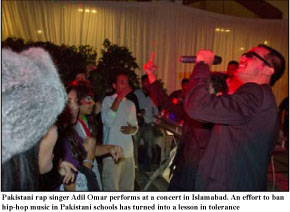Pakistanis Debate Merits of Hip-Hop
By Michele Langevine Leiby

Islamabad: An effort to ban hip-hop music in Pakistani schools has instead turned into a lesson in tolerance in a nation where religious fundamentalism has been on the rise.
In late January, Pakistan’s Punjab Assembly passed a resolution to end “objectionable” music concerts in public and private schools. But the measure was widely repudiated in the media for impinging on free creative expression.
“What’s next? A resolution seeking a ban on wearing jeans in academic institutions?” one assembly member asked during the ensuing debate.
A few days after it passed, the measure was overturned. The abrupt about-face highlights the sometimes tense balance in Pakistan between a youth culture raised on a constant diet of YouTube and Facebook and conservative Pakistanis willing to curb certain freedoms for the sake of tradition and cultural integrity.
The fracas evidently was sparked, at least in part, by two recent incidents. In January, three young women were trampled to death after a concert at a Punjab college by popular Pakistani singer Atif Aslam. Three months earlier, the FEW Collective, a hip-hop group from Chicago, performed in Islamabad and ran afoul of the Pakistani military; the group was detained when one member was accused of photographing sensitive installations in Rawalpindi.
Punjab assembly member Seemal Kamran introduced the anti-rap resolution and pushed it through the provincial assembly. “I live in this society and everybody knows it is a conservative society,” she said in an interview. “In the US and Canada and England they have these things. It’s okay with them because it’s their culture.”
A mother of four, Kamran said she believes banning hip-hop concerts and other “vulgar” music is necessary to preserve traditional Pakistani family values. Kamran insisted that students themselves are against objectionable hip-hop lyrics, and their parents agree with them.
“Even in your culture there are a few things that you don’t allow and the same is true for Pakistan,” she said.
The controversy presented a potentially awkward moment for the State Department, which has engaged in so-called hip-hop diplomacy, using the art form in its cultural outreach efforts in Pakistan and elsewhere.
The efforts will continue. “We consider such cultural exchange programs as jazz, hip-hop, and country music performers to be important components in our efforts to broaden and deepen our bilateral relationship,” US Embassy spokesman Mark Stroh said by e-mail. “These kinds of exchange programs, in concert with our historic and cultural preservation efforts and our educational exchanges, build people-to-people ties between Pakistan and the United States and have been well-received across Pakistan.” – Washington Post
-------------------------------------------------------------------------------------

